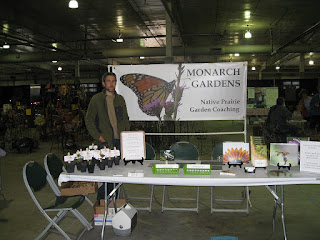Let’s start with a refresher–James Wright’s wonderful poem.
Milkweed
While I stood here, in the open, lost in myself,
I must have looked a long time
Down the corn rows, beyond grass,
The small house,
White walls, animals lumbering toward the barn.
I look down now. It is all changed.
Whatever it was I lost, whatever I wept for
Was a wild, gentle thing, the small dark eyes
Loving me in secret.
It is here. At a touch of my hand,
The air fills with delicate creatures
From the other world.
Yesterday, I spent nearly seven hours at Spring Affair, billed as the largest plant sale in the Midwest. At 9am thousands rushed in, an in an hour or two half the plants were gone, a hundred tables suddenly empty. Pockets of plants were left here and there, most noticeably to me was milkweed (and ironweed, one monarchs love to nectar on). Of course, the hostas were selling like hotcakes.

My garden coaching business banner has a monarch prominently displayed, and many eyes lit up ten feet away as folks approached and regaled my wife and I with butterfly stories, while others asked what was going on with the influx of butterflies now (red admirals and sulphurs). Many spoke fondly of their butterfly bushes. When I asked if they had milkweed, I often heard “No. Should I have t&# 104;at?” Of course! No milkweed, no monarchs–and no lots of other butterflies gorging on that rich nectar.
We need more James Wright moments in our landscapes, and that’s the primary reason when I was asked a couple times yesterday if I did speaking engagements, I rushed home and created a list of topics.
I also had enough people come up to me and say what a cool idea a native plant garden coach was, wishing me much success, that I feel emboldened (and exhausted), but unsure now what direction to take next. So, I’ll start here with another plea: PLANT MILKWEED. Butterflies and other pollinating insects are in great need of our help as we spray chemicals first and ask questions later, like what happened to a 8;l the butterflies. Indeed, on a recent episode of a local garden show on PBS, advice was given to spray earthworms in the evening with sevin to control them (how many problems can you point out in that sentence?).
If you have a butterfly garden, as many do, not having milkweed is like not having a butterfly garden at all. Asclepias incarnata, purpurascens, sullivanttii, syriaca. Go. Dig. Now. And stay away from chemicals. Soon, if you plant natives, the good bugs will control the bad bugs. I promise. The air will soon fill with delicate creatures from the other world.
No comments:
Post a Comment